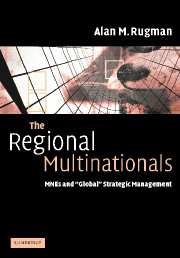Book contents
- Frontmatter
- Contents
- List of figures
- List of tables
- Acknowledgments
- Chapter 1 Introduction
- Chapter 2 Regional multinationals: the data
- Chapter 3 Two regional strategy frameworks
- Chapter 4 Regional and global strategies of multinational enterprises
- Chapter 5 Retail multinationals and globalization
- Chapter 6 Banking multinationals
- Chapter 7 Pharmaceutical and chemical multinationals
- Chapter 8 Automotive multinationals
- Chapter 9 Profiles of leading multinational enterprises
- Chapter 10 Analysis of the regional and global strategies of large firms
- Chapter 11 Regional multinationals and government policy
- Chapter 12 Regional multinationals: the new research agenda
- Appendix: The 500 companies with triad percent sales, alphabetical, 2001
- Company notes
- Case references
- Academic references
- Author index
- General index
Chapter 12 - Regional multinationals: the new research agenda
Published online by Cambridge University Press: 18 December 2009
- Frontmatter
- Contents
- List of figures
- List of tables
- Acknowledgments
- Chapter 1 Introduction
- Chapter 2 Regional multinationals: the data
- Chapter 3 Two regional strategy frameworks
- Chapter 4 Regional and global strategies of multinational enterprises
- Chapter 5 Retail multinationals and globalization
- Chapter 6 Banking multinationals
- Chapter 7 Pharmaceutical and chemical multinationals
- Chapter 8 Automotive multinationals
- Chapter 9 Profiles of leading multinational enterprises
- Chapter 10 Analysis of the regional and global strategies of large firms
- Chapter 11 Regional multinationals and government policy
- Chapter 12 Regional multinationals: the new research agenda
- Appendix: The 500 companies with triad percent sales, alphabetical, 2001
- Company notes
- Case references
- Academic references
- Author index
- General index
Summary
One of the puzzles of international business research is that the key actor, the multinational enterprise (MNE), appears to have a very unevenly distributed geographic dispersion of sales. The MNE is usually a regionalized rather than a globalized business. Three definitions matter:
(i) multinational enterprise: a firm with operations across national borders
(ii) global business: a firm with major operations (at least 20% of its total sales) in each of the three regions of the “broad triad” of the European Union (EU), North America, and Asia-Pacific, but without one dominating region;
(iii) regional business: a firm with the majority of its sales inside one of the triad regions, usually the home region.
The following empirical observations have also been made:
(i) the world's 500 largest MNEs account for over 90% of the world's stock of foreign direct investment (FDI) and over half of world trade, usually in the form of intra-firm sales (Rugman, 2000);
(ii) of these 500 MNEs, only nine are “global”;
(iii) the vast majority of the 500 MNEs (320 of the 380 for which data are available) are home-region based and derive an average of 80% of their sales intra-regionally.
These stylized facts suggest a new research agenda for the international business field, as requested by Buckley (2002). In this chapter, we explore some aspects of this. The observed regionalization can be given a simple transaction cost economics (TCE) explanation.
- Type
- Chapter
- Information
- The Regional MultinationalsMNEs and 'Global' Strategic Management, pp. 224 - 241Publisher: Cambridge University PressPrint publication year: 2005



